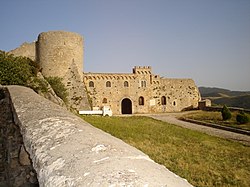Bovino (FG)
| Bovino | |
|---|---|
| Comune | |
| Comune di Bovino | |

Romanic castle of Bovino with Norman Tower
|
|
| Location of Bovino in Italy | |
| Coordinates: 41°15′N 15°21′E / 41.250°N 15.350°E | |
| Country | Italy |
| Region | Apulia |
| Province / Metropolitan city | Foggia (FG) |
| Frazioni | Ponte Bovino, Radogna |
| Government | |
| • Mayor | Michele Dedda |
| Area | |
| • Total | 84 km2 (32 sq mi) |
| Elevation | 647 m (2,123 ft) |
| Population (31 December 2014) | |
| • Total | 3,385 |
| • Density | 40/km2 (100/sq mi) |
| Demonym(s) | Bovinesi |
| Time zone | CET (UTC+1) |
| • Summer (DST) | CEST (UTC+2) |
| Postal code | 71023 |
| Dialing code | 0881 |
| Patron saint | Maria SS. of Valleverde |
| Saint day | August 29 |
| Website | Official website |
Bovino is a comune and hilltop town at the foot of the Irpinia mountains in the province of Foggia, in the region of Apulia in southern Italy.
Bovino is currently a member of the society "Italy's Most Beautiful Villages". On April 5, it was voted Italy's fifth prettiest village, during the national TV contest "Il Borgo dei Borghi".
Bovino has more than two thousand years of history, and in 323 BC, participated in the Samnite Wars, fighting against the Romans. The Romans subsequently rebuilt the town, calling it Vibinum. During the Second Carthaginian War, it is likely that Hannibal camped on Monte Castro during his march to Rome.
In 663, after being conquered by the Lombards, Bovino was destroyed during the war with the Byzantines. In 876, after the Byzantine reconquest, the walls around Bovino were rebuilt by Emperor Basil I, and the streets were laid out in their characteristic narrow design. In the 11th century, during the Norman conquest of southern Italy, Bovino was one of the last remaining Byzantine strongholds. In 1656, bubonic plague killed the majority of the local population, and only 1,200 people survived.
The largest single edifice is the Norman castle. It occupies a commanding view of the village. The courtyard is permanently open.
The villa communale is a municipal park with ponds and fountains, housing an extensive arboretum lined with horse chestnut trees.
There are several panorama viewpoints. Most are next to remains of the original Roman wall. Several streets in the historic centre are still stepped and paved with cobbles. Other ancient sights include the Roman aqueduct.
Bovino is home to several ancient churches. The oldest is St. Peter's (Italian San Pietro), which was built on the site of an ancient temple dedicated to Hercules. The Gothic-style Church of the Rosary (Italian Chiesa del Rosario) has an elongated brick campanile. The Cathedral is dedicated to the Blessed Virgin Mary. Its interior varies in style according to the construction period. The most ancient section is the chapel of San Marco in Ercana, housing the relics of this local patron saint. The church of San Pietro contains a painting of the crucifixion of St. Peter by the Master of Bovino of the Caravaggio school.
...
Wikipedia

